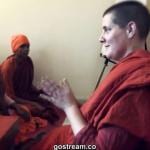An online petition asking for local Shambhala Buddhism centers to be split from the inner circle of followers of Osel Mukpo (a.k.a Sakyong Mipham Rinpoche) has been created. It is directed to the Shambhala Interim Board, Shambhala International, Osel Mukpo, Local Shambhala Centers, Local Leadership, and the Shambhala Press Team.
They cite the recently released investigation into Mukpo, which affirms likely sexual misconduct, as a “third strike” on the leadership after numerous alleged abuses on the parts of Thomas Rich and Chogyam Trungpa. Allegations of abuse have been investigated by Wickwire Holm, a firm hired by Shambhala International. Findings of the investigation are available at their website Shambhala Community Care.
Carol Merchasin, who volunteered for Buddhist Project Sunshine wrote an extensive response to the report. Her reflections include gratitude, in part that the report shows patterns of misconduct and abuse of power, regrets, including that many of those harmed did not come forward, noting the history of betrayal, silencing and shunning by Shambhala, clarifications, noting that the report did substantiate sexual assault by Sakyong Mipham and that this is a criminal offense with no statute of limitations in Nova Scotia where it took place; and disappointments, including a failure to look at the leadership who knew about and helped cover up the Sakyong’s behavior.
Read her full message here.
Read the Buddhist Project Sunshine reports One, Two, and Three here, and a huge (June 30, 2018) “list of links relevant to the current crisis in Shambhala International regarding Sakyong Mipham Rinpoche’s conduct with women” here.
Buddhistdoor Global has also been covering events in and around Shambhala, including an in depth interview last year with Andrea Winn, founder of Buddhist Project Sunshine.
Read the petition and see the link at the bottom to sign:
Problem
In summer 2018, Osel Mukpo, the spiritual leader or “Sakyong” of Shambhala International, was first publicly alleged to have committed sexual misconduct, including assault, against several of his female students. Some of these assaults were further alleged to have been directly facilitated by Mukpo’s loyal senior students. These allegations were first made public by Buddhist Project Sunshine and while an independent review has been conducted to mixed conclusions, we recognize basic structural problems in that review. We find the lion’s share of these allegations credible. They affirm a longstanding pattern of misconduct by historical leaders of the organization. In light of this revelation, individual Shambhala centers must enact the end of the Shambhala monarchy and formally extricate themselves from Shambhala International and the Mukpo family so as to protect new and established meditation students from harm.
Solution:
Shambhala International was inspired by Chogyam Trungpa’s aspiration to make secular meditation training broadly available to the general public. The organization which ultimately resulted is a centralized hierarchical body. It boasts numerous local centers on several continents. Tens of thousands of people around the world had their first experience of meditation and encountered the Dharma at these centers, affording the organization a prevalence that is unique among Buddhist organizations.
However, Shambhala has also produced an unhealthy and untenable authoritarian organizational culture; all students have been funneled towards a single guru who now faces serious allegations of sexual misconduct. This problem was described well in Ethan Nichtern’s statement on resigning as a Shastri shortly after the allegations were made public.
In recent months, we have been deeply disturbed by the response of Shambhala leadership in two ways. First, by framing this moment as some kind of collective project of self-reckoning, it has obfuscated a clear and obscene abuse of power by the Sakyong and many complicit others. Second, by allying itself with the broader emergent social movement for racial, gender and economic justice, the organization has made a calculated attempt to avoid directly confronting and remediating those harms which have resulted from the dangerous merger of an accessible educational institution and an esoteric authoritarian body.
On the second count, we wholly support all processes of institutional self-reflexivity which genuinely reckon with real issues of cultural bias, social representation and inequality, but we see SI’s current actions as a cynical withdrawal from and evasion of the more immediate need to critically examine its own unusual institutional structure and accompanying philosophy which have together enabled and promoted a culture of harm and abuse. Osel Mukpo’s transgressions represent a kind of “third strike” following on the misconduct of former leaders Thomas Rich and Chogyam Trungpa. We are especially concerned that SI’s bad-faith appropriation of a social movement stands to taint the righteous work of those many actors who have, in good faith, devoted themselves to this righteous cause.
Despite these revelations, we continue to cherish the dharma and the Shambhala teachings. We aspire to preserve what has been good and indestructible about our experiences in Shambhala yet we cannot possibly remain in the current double bind of obligatory loyalty to what increasingly appears to be a dangerous cult simply so that we can maintain our connection to our own sanghas.
We call on Shambhala International (SI) to take immediate action to modify its unique institutional structure as the organizational center of both 1) an authoritarian esoteric tradition with a body of sworn devotee students loyal to Mukpo, and 2) a highly accessible public educational meditation institution. We do not hold high hopes.
Yet this is, in the end, our sangha, not theirs. We are Shambhala.
We believe the public (outer) Shambhala teachings are robust enough to support a non-hierarchical practice community.
To this end, we call on individual Shambhala centers to demand that SI facilitate the cleavage of the two aspects described above by recognizing and supporting the centers’ transition to full organizational and financial autonomy. We also hope that local centers will explore reinventing their own organizational structures on a model of consensus and direct democracy. We are encouraged to see some centers hosting teachers, like Lama Rod Owens and Lama Tsultrim Allione, from other lineages and traditions and hope this pattern will emerge as a viable future for these centers, perhaps bound together in an informal consortium.
Sign the petition here.
please join our community of patrons.













